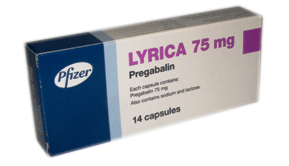Lyrica contains Pregabalin and is manufactured by Pfizer, Lyrica is used to treat neuropathic pain sometimes caused by the shingles virus. Lyrica has also been found to be effective in treating fybromyalgia and spinal cord injury.
It can also be used as an adjunct therapy for partial seizure disorders.
Lyrica is now also indicated in treating diabetic peripheral neuropathy.
It is considered to have a low potential for abuse and addiction.
The most common side effects of pregabalin are dizziness, drowsiness, dry mouth, edema (accumulation of fluid), blurred vision, weight gain, and difficulty concentrating. Other side effects include reduced blood platelet counts, and increased blood creatinine kinase levels. Increased creatinine kinase can be a sign of muscle injury, and in clinical trials three patients experienced rhabdomyolysis (severe muscle injury). Therefore, patients should report unexplained muscle pain, tenderness or weakness to their doctors, especially if associated with fever and malaise (reduced well-being). Pregabalin has rarely been associated with angioedema (swelling of the face, tongue, lips, and gums, throat and larynx).
Antiepileptic medications have been associated with increased risk of suicidal thinking and behavior. Anyone considering the use of antiepileptic drugs must balance this risk of suicide with the clinical need. Patients who are started on therapy should be closely observed for clinical worsening, suicidal thoughts, or unusual changes in behavior.
Alcohol and drugs that cause sedation may increase the sedative effects of pregabalin. Pioglitazone (Actos) and rosiglitazone (Avandia) cause weight gain, fluid retention, and possibly heart failure. Therefore, combining pregabalin with these drugs may increase the occurrence of weight gain and fluid retention.












